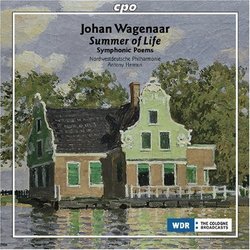| All Artists: Wagenaar, Nordwestdeutsche Phil, Hermus Title: Johan Wagenaar: Summer Of Life, Symphonic Poem Members Wishing: 0 Total Copies: 0 Label: Cpo Records Original Release Date: 1/1/2009 Re-Release Date: 11/17/2009 Genre: Classical Style: Symphonies Number of Discs: 1 SwapaCD Credits: 1 UPCs: 761203747924, 761203747924 |
Search - Wagenaar, Nordwestdeutsche Phil, Hermus :: Johan Wagenaar: Summer Of Life, Symphonic Poem
 | Wagenaar, Nordwestdeutsche Phil, Hermus Johan Wagenaar: Summer Of Life, Symphonic Poem Genre: Classical |
Larger Image |
CD Details |
CD ReviewsDelightful Late Romantic Dutch Orchestral Music J Scott Morrison | Middlebury VT, USA | 12/26/2009 (4 out of 5 stars) "I imagine most music lovers outside the Netherlands don't know the music of Johan Wagenaar (1862-1941). I first heard something of his (the Overture to Cyrano de Bergerac) a few years ago on a disc with music by several Dutch composers Dutch Composers and really liked it. This disc contains five short orchestral pieces, all of which are worth hearing. And the performances by Antony Hermus and the Nordwestdeutsche Philharmonie serve them well.
The latest piece, but the first track on the CD, is the Overture to 'De getemde feeks' ('The Taming of the Shrew'), a rollicking, humorous piece notable for its superb orchestration and use of post-Straussian harmonies. Seven minutes long, it would make a superb concert opener, a function it serves fairly often in Dutch orchestral programs. Next comes 'Levenszomer' ('Summer of Life'), a joyous fifteen minute piece that certainly conveys the joy of one's young maturity; Wagenaar wrote it not long after his marriage (which had been delayed by his bride's family because of Wagenaar's illegitimacy, still a factor in those days) and the birth of his first children. The epigraph for the piece talks about the piece being 'the sum of my happy life.' Opposite in mood is the tone poem 'Saul en David' ('Saul and David'), in which, not surprisingly, the harp plays an important role. The work was written in conjunction with pieces by Alphons Diepenbrock and Willem Mengelberg, among others, in celebration of an exhibition of Rembrandt's paintings. In the Saul and David painting young David attempts to alleviate King Saul's intense moods with his harp. The tone poem is the most dramatic music on the disc and makes greater use of chromatic harmonies and occasionally astringent orchestration early on and after David's ministrations with his harp the harmonies moderate and the King begins to feel less angst. The five-minute 'Romantic Intermezzo' (1894) is altogether more lyrical and pastoral and reminds one of Wagner in a similar mood. The English horn has a prominent role. The CD concludes with the earliest work here, 'Frithjofs Meerfahrt' ('Frithiof's Sea Voyage'), based on Swedish poet Esaias Tegnér's 'Frithiof's Saga' in which the exiled Frithiof and his men are threatened by sea monsters and their boat smashed to pieces. There are episodes in which Frithiof's life flashes before his eyes (including a lyrical section in which he recalls his lady love). Musically one is reminded of both Brahms and Wagner. This is not deathless music (although I would still nominate 'The Taming of the Shrew' for occasional performances) but it is certainly enjoyable and worth hearing. Scott Morrison" |
